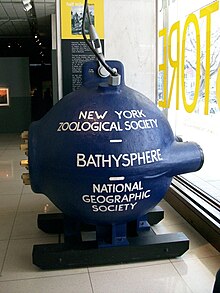bathysphere
A bathysphere or bathysphere (also known as a deep sea sphere ) is a pressure chamber with an internal atmospheric pressure and is used for diving . The word is made up of the two Greek words bathys (deep) and sphaira ( sphere ). The thick walls are tight and withstand the water pressure, so the pressure in the cabin does not change in the water, unlike the diving bell .
The bathysphere is a hollow sphere that is lowered into the depths of the sea by a mothership on a cable. It doesn't have its own propulsion system like a deep-sea submarine .
The immersion sphere of the later bathyscaphe is also known as the bathysphere .
The first bathysphere was built in 1930 by Professor Charles William Beebe and his engineer Otis Barton . The idea came from Beebe and originally envisaged a cylindrical pressure body, Barton improved this construction by using a spherical shape. With this device they dived 435 meters below the surface of the Bermuda Islands in 1930 , 661 meters in 1932 and on August 15, 1934 - a sensational at the time - 923 meters below the surface of the sea. An improved construction by Barton called the Benthoscope had a greater wall thickness and thus reached a depth of approx. 1370 m in August 1949.
The Beebe and Barton bathysphere was technically very simple. It was a hollow steel ball with holes for quartz glass windows, the access hatch and the cable feed, which was suspended from a steel cable. The entrance was at the rear, the hatch there was screwed on with wing bolts from the outside after the crew had boarded. Apart from battery-operated headlights and a telephone connection to the mother ship, there was no technical equipment on board. Carbon dioxide was extracted from the breath by soda lime placed in a bowl , and conversely, oxygen was supplied from a pressure bottle. During later dives, the air circulation was additionally stimulated by an accompanying fan .
Technical data of the first bathysphere
- 1.44 m diameter
- Wall thickness 38 mm
- Access hatch diameter 35 cm
- three quartz glass windows : 20 cm in diameter, 75 mm in thickness
- Weight (without passengers): 2270 kg
Web links
- English article about the deep sea explorer William Beebe
- Homepage of the deep-sea exhibition in the Senckenberg Nature Museum
